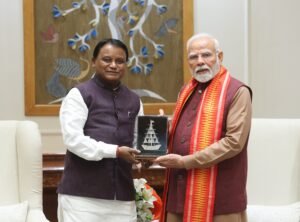New Delhi (PIB): In a major shift, India surpassed Japan to become the third-largest power in the Asia Power Index, reflecting its increasing geopolitical stature. This achievement is driven by India’s dynamic growth, youthful population, and expanding economy, solidifying its position as a leading force in the region.
One of the most significant findings in the 2024 Asia Power Index is India’s steady rise in the regional power rankings. Witnessing a gradual rise, India is looking to achieve its full potential and exercise its influence in the region.
Key Factors Behind India’s Rise:
1. Economic Growth: India has shown remarkable post-pandemic economic recovery, contributing to a 4.2-point rise in its Economic Capability. India’s massive population and strong GDP growth reinforce its standing as the world’s third-largest economy in PPP terms.
2. Future Potential: India’s Future Resources score increased by 8.2 points, signalling a potential demographic dividend. Unlike its regional competitors, particularly China and Japan, India benefits from a youthful population that will continue to drive economic growth and labour force expansion in the coming decades.
3. Diplomatic Influence: Prime Minister Narendra Modi’s leadership has garnered greater international recognition. India’s non-aligned strategic posture has allowed New Delhi to navigate complex international waters effectively. India ranked 6th in terms of diplomatic dialogues in 2023, reflecting its active engagement in multilateral forums.
Further, India’s large population and economic capabilities offer it substantial promise. India’s score in Cultural Influence has also remained relatively strong, underpinned by its global diaspora and cultural exports.
In addition, India’s role in multilateral diplomacy and security cooperation has been a point of emphasis. India’s participation in dialogues, as well as its leadership in the Quad, has allowed it to play a significant role in regional security dynamics, albeit outside of formal military alliances. India’s economic outreach, though limited, has seen incremental improvements, particularly in defense sales, such as the BrahMos missile deal with the Philippines. These developments, though small in scale, suggest that India is beginning to flex its geopolitical muscles beyond its immediate neighborhood.
India’s Role in Asia
The 2024 Asia Power Index shows India as a power to reckon with in Asia. The country’s substantial resource base gives it immense potential for future growth. The outlook for India is optimistic. With continued economic growth and a burgeoning workforce, India is well-positioned to expand its influence in the years ahead. In particular, India’s rising Diplomatic Influence and its strategic autonomy make it a key player in the Indo-Pacific Region.
Asia Power Index
The Asia Power Index, launched by the Lowy Institute in 2018, is an annual measure of power dynamics in the Asia-Pacific region. It evaluates 27 countries across the Asia-Pacific, examining their ability to shape and respond to the external environment. The 2024 edition offers one of the most comprehensive assessments of power distribution in the region to date. Timor-Leste has been included for the first time, reflecting its growing importance in Southeast Asia. The Index focuses on both the material capabilities of states and the influence they exert on the international stage.
Criteria and Parameters of Power Measurement
Power in the Asia Power Index is divided into resource-based and influence-based determinants:
1. Resource-Based Determinants:
- Economic Capability: The core economic strength of a country, measured through indicators like GDP at purchasing power parity (PPP), technological sophistication, and global economic connectivity.
- Military Capability: Evaluates conventional military strength based on defense spending, armed forces, weapon systems, and signature capabilities like long-range power projection.
- Resilience: The internal capacity to deter threats to state stability, including institutional robustness, geopolitical security, and resource security.
- Future Resources: Forecasts the future distribution of resources, including economic, military, and demographic factors projected for 2035.
2. Influence-Based Determinants:
- Economic Relationships: The capacity to exercise leverage through trade, investment, and economic diplomacy.
- Defense Networks: The strength of alliances and partnerships, measured through military cooperation and arms transfers.
- Diplomatic Influence: The extent of a country’s diplomatic reach, participation in multilateral forums, and foreign policy ambition.
- Cultural Influence: The ability to shape international public opinion through cultural exports, media, and people-to-people ties.
A country’s overall power score is derived from a weighted average of these eight measures, encompassing 131 individual indicators. The results offer a nuanced understanding of how countries convert their resources into influence within the Asia-Pacific.









